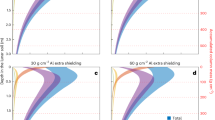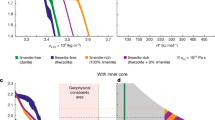Abstract
THE reception of radio signals from the orbiting lunar spaceship Endeavour after its occupation behind the lunar limb seems to confirm in part a previous suggestion1. Similar observations arranged with the lunar command module during the Apollo 14 mission were unsuccessful because of interference from local emissions.
This is a preview of subscription content, access via your institution
Access options
Subscribe to this journal
Receive 51 print issues and online access
$199.00 per year
only $3.90 per issue
Buy this article
- Purchase on SpringerLink
- Instant access to the full article PDF.
USD 39.95
Prices may be subject to local taxes which are calculated during checkout
Similar content being viewed by others
References
Salisbury, W. W., Nature, 211, 950 (1966).
Salisbury, W. W., “The Properties of the Moon as a Radio Lens”, Proceedings of the Conference on Electromagnetic Properties of the Moon, June 1968, Ames Research Center (1970).
Gold, T., Campbell, M. J., and O'Leary, B. T., Science, 167, 207 (1970).
Norton, K. A., Proc. IRE, 29, 623 (1941).
Vogler, L. E., National Bureau of Standards Rep. No. 7239 (1962).
Author information
Authors and Affiliations
Rights and permissions
About this article
Cite this article
SALISBURY, W., FERNALD, D. Post-occultation Reception of Lunar Ship Endeavour Radio Transmission. Nature 234, 95 (1971). https://doi.org/10.1038/234095a0
Received:
Issue date:
DOI: https://doi.org/10.1038/234095a0



